Popular Pages
Confronted with many challenges and barriers that put immense pressure on many British firms’ bottom line, it’s becoming more difficult for UK businesses to remain competitive in global markets. We’ve looked closely at the top three challenges facing Alpha Manufacturing, part of The HEX Group, and how we’re combatting these.
Increased Energy Costs – Due to an attempt to rapidly transition to renewable energy from fossil fuels, and the ongoing world conflict, energy costs are snowballing. Almost 60 per cent of companies within the manufacturing sector highlight how rising energy bills are threatening their business. Tackling this problem head-on, in 2022, Alpha Manufacturing installed 1770 solar panels covering 3,570.5m2 of roof space. Over 12 months, this will save the company 150t in CO2e carbon emissions and take the business one step closer to achieving carbon neutrality by 2037.
Recruitment Challenges, Staff Retention and Skill Shortage – The typical cost to recruit a new employee in the UK is £3,000. As a result of economic inactivity – people not working and not looking for work – labour supply and employment are below pre-pandemic levels. The need for skilled workers continues, but an ageing population and fewer young people taking vocational courses have compounded the problem, especially in the manufacturing and engineering sectors, which rely heavily on the expertise of engineers. Employing almost 500 employees across The HEX Group, Group People and Culture Manager Karen Barnacle faces these challenges regularly says
“Recruitment and retention have become a real challenge over the past 2 years, with vacancies that we would previously fill relatively easily now taking a lot longer. In order to try and alleviate this problem, we have implemented several recognition and reward packages for our employees including a 10% pay increase, a refer a friend scheme and an employee health cash plan. However, the lack of available skilled resource is still a real concern for us as a business”.
Supply Difficulties – Supply chain disruption in the UK can be very complex. High transport costs, Brexit trade barriers, global supply problems and panic buying have all contributed to manufacturing delays. Supply chain issues hinder economic development by preventing British companies from exporting goods abroad at competitive prices. Alpha Manufacturing has seen first-hand how the supply chain can affect day-to-day business.
Michael Whitfield, Sales Director for Alpha Manufacturing, explains, “We’re passionate about investing in supply chain integration at Alpha. In the past, we’ve experienced challenges outsourcing certain processes to outside suppliers. By bringing more and more processes in-house and investing in capacity and automation, we take supply chain risk away from our customers and maximise production control. Similarly, since the pandemic, we have seen a surge in UK businesses looking to bring their supply chain back to the UK from overseas. As a British manufacturing business, we are happy to help our customers eliminate their challenges around delivery delays and import complexity”.
UK manufacturers are resilient by nature; however, they face another 12 months of uncertainty and remain stretched. At Alpha Manufacturing, we work closely with our customers to ensure we meet their project deadlines and deliver excellent quality products every time.
Staffordshire engineering and manufacturing business, Bri-Stor Group, which includes multi-award-winning businesses Bri-Stor Systems, Alpha Manufacturing, Atlas Coating, Hex Graphics and HEX Living has announced that from 3rd May 2022 the Group will be known as The HEX Group.
With the company launching its Alpha Manufacturing Chemical Technologies business in 2021 coupled with the recent launch of HEX Living – a new division designing and manufacturing leisure and garden products – 2022 is the time to present a new Group brand that better reflects the businesses’ total market offer.
Martin Smith, The HEX Group CEO, has led the development of the new brand and he comments: “The Bri-Stor Group has stood for world-class engineering and manufacturing for almost 40 years, and I am proud of our achievements as a Group. From its inception, our family values have underpinned the success of our business, resulting in long-term trusted partnerships and today, we continue to form strong alliances in new and exciting markets.
“This is more than a name change. It’s our opportunity to present to the market a new and reinvigorated strategy that better reflects the breadth and diversity of our total Group offer. For those familiar with the Bri-Stor Group, the hexagon shape has always formed part of our brand story, so it seemed fitting that we bring it to the fore and not lose sight of how it all began. These are incredibly exciting times for the business and as we continue to grow and extend our market presence, we create more jobs and further contribute to the wider economic prosperity of the region.”
The five trading divisions of The HEX Group remain central to the commercial output of the business, yet new for 2022, the business is formally launching HEX Careers – the sixth component of the Group. With a highly respected Apprenticeship and Higher Apprenticeship programme in its 12th year, the Group is now focused on a wider people-development strategy which includes several new initiatives including The HEX Group Accelerate Programme.
Martin Smith explains more: “We have always placed a great deal of emphasis on the development of young people seeking a career in engineering and manufacturing and last year, we further enhanced our Apprenticeship Programme with the launch of nine Higher Apprenticeships. As we continue to grow the Group, we recognise more than ever that we need to give the wider team every opportunity to enhance their career with both formal and informal education and training. I want The HEX Group to be a business that people aspire to join and in doing so we reinforce ‘family’ as the central value that will continue to drive our great business forward.”
Sheet metal has been used throughout history for a great number of reasons, even more frequently in the modern world for new and demanding applications. Made from metals such as stainless steel, mild steel or aluminium, it is formed through an industrial process into thin sheets, which can be cut or bent into the shape required for its desired function.
In the past, sheet metal has historically been used in applications such as architecture and plate armour, with fabrication methods advancing over the centuries of its use. Given its malleability, the potential uses for sheet metal today cover a broad range of industries and sectors, including:
For the agriculture and farming industry, it’s necessary that modern machinery and other tools can withstand heat and wear in all weather conditions. Whether used in or outdoors, high-quality metal is a must for these parts to be durable, remain efficient, and do the job right – as such, it’s critical to use quality sheet metal from a reliable source.
Alpha Manufacturing aids the agriculture industry with the design, manufacture and supply of body kits and fenders, tread plates, military spec brackets, agricultural fan cowls and various engine components made from sheet metal that’s built to last.
Sheet metal is used predominantly in the automotive sector, in the manufacture or repair of vehicles in any size. Steel is most commonly used due to its affordability and the ease that it can be pressed into the required shape. The requirement for a safe and reliable product means that the standards in this industry are strict and must be adhered to. It is therefore vital that all products in this sector are subject to rigorous quality checks to ensure that they are fit for purpose, to create road-ready vehicles every time.
We supply various high-quality components for automotive applications to our sister company, Bri-Stor Systems. This includes tread plates and steps, hoods & fenders, hardtop conversion kits, brackets, components and chassis, and radiator cowls.
Within the electrical sector, there is a broad range of products that use sheet metal in its manufacture. These range from retail solutions such as kiosks and gaming systems, lighting solutions, power generation such as those for solar energy systems and power testing products, and air conditioning.
For this extensive sector, sheet metal is commonly used in homes, outlets and factories for commercial and retail use around the world. Our solution sees these widely-used products through design and engineering, manufacture, assembly, integration, testing and delivery for a fully monitored and tailored service from start to finish.
Within the healthcare and medical sector, sheet metal plays an important role in the equipment used to treat patients. Stainless steel is an ideal metal for this application due to its strength and resistance to corrosion, as well as its rust-proof qualities – ideal for a strictly hygienic environment.
Another industry for which standards are imperative, these products are made and tested for optimum robustness, suitability and functionality according to legislative requirements. These metals are used in the manufacture of frames for various kinds of furniture, including reclining beds and chairs, ward furniture, reception seating and other utility structures such as dining. Additionally, they are used as components in x-ray and scanning equipment frequently used in hospitals, care homes and surgeries.
We provide a fabrication service for the requirements of any task to aid the healthcare sector, from design all the way through to manufacture. For every step of the process, quality, durability and efficiency are kept at heart.
There are countless other industries across the globe that rely on the attributes and functionality of sheet metal. For more information on the sectors we serve, visit our sectors page, or contact us if you have any questions.
With any product on the market, it’s important to deliver a reliable, timely service – however, king above that is quality. A quality product needs a quality process, from design all the way to manufacture, using only the best tools, materials and processes.
In the case of sheet metal products, quality matters each step of the way. While often overlooked, metal manufacturing creates countless everyday items around the world, from lighting solutions to equipment used in hospitals, to homes and cars. This is why we utilise the finest technology and practices here at Alpha Manufacturing, where quality is at the heart of what we do.
The first step to ensuring a high-quality sheet metal product is in its design. A thorough value analysis / value engineering process is used to inform an optimised design with consideration for materials, features, processes and resourcing ahead of production.
By using cutting-edge computer-aided design (CAD) and computer-aided manufacturing (CAM) design to develop the product in a virtual, 3D environment, product models can be made to exact client specifications ahead of prototyping or manufacture. CAD software enables precise designs and allows for any necessary changes to be made quickly, with New Product Introduction (NPI) staff on-hand to ensure that design specifications and standards are met throughout. A fault at the design stage will cause delays and countless issues in the later stages of manufacture, so it’s imperative to establish a quality design first time.
With the design finalised and prototypes approved, the product is ready to be manufactured and production can begin, through a number of processes that use the latest technology:
Laser cutting is a precise, powerful thermal cutting process to cut the design according to the CAD/CAM file. Using either fibre or CO2 laser source, this method achieves a smooth, clean and accurate result, avoiding sharp edges and deviations that would require further clean-up. Its precision is down to its focus of 25 microns and positioning accuracy of 10 micrometres – additionally, this method includes the benefits of heightened safety and speed for a truly streamlined process.
CNC folding is an automated method of metal folding, giving the metal product its shape. If handled improperly, this process can risk damaging the product, warping its shape or folding the metal with inaccuracies. However, the technology available at Alpha, such as the Trumpf Trubend Cell 7000 or Salvagnini P4 Lean Panel Bender, handles this process with optimum speed, accuracy and reliability to mould the shape with a high-quality result every time.
Laser oxide removal is the process of removing laser oxide scale from the edge of a product that has undergone laser cutting. The cutting process leaves an off-colour finish around the edges, which prevents future coating from being applied, for example paint, which will chip and flake easily if the laser oxide scale is not dealt with. The automated Lissmac SBM M 1000 offers two-sided removal of oxide layers in efficient time compared to one-sided options, meaning that parts can then be coated or painted with a quality finish.
Powder coating is the process of applying a paint finish to a metal part. This uses a positively charged polymer powder, which is applied to the product before being cured with heat for a finished covering. In addition to the inherent quality of this process, which results in a finish that is more resistant to chipping, fading and wearing than other paint finishes, we apply a five-stage pre-treatment for additional benefits. OXSILAN® pre-treatment technology is used for metal surface treatment for superior corrosion resistance, replacing traditional iron and zinc phosphate products for an improved ecological profile.
Assembly is the final step in the manufacturing process, with a dedicated department working to SOP quality standards for products such as server cabinets, balcony cassettes, heating systems, medical beds and more. Assembly at Alpha Manufacturing has become increasingly complex in recent times with large scale assemblies and full integration now common place for our assembly department.
That’s not all – our other processes include XP prototyping, CNC punching, stainless steel fabrication, CNC turning and machining, and welding. Once a product is manufactured, it undergoes an end-of-line product inspection by a dedicated team of experts, using CMM technology to ensure each final product aligns with our high-quality standards.
Without these procedures for quality in place, a product in the metal manufacturing process is at risk of being flawed and not fit for its purpose. Every precaution must be taken during each phase to ensure that it is done correctly, efficiently and with a quality final result.
At Alpha Manufacturing, we use all of these measures for quality in all of our procedures. We are ISO 9001 and ISO 14001 accredited and committed to supplying products to both high-quality and environmentally friendly standards. For more information or any questions you may have, please contact us today.
Here at Alpha Manufacturing, we are proud to specialise in all areas of sheet metal engineering in the UK. We offer a complete fabrication service to our customers, from concept and design all the way through to the end product. At every step of the fabrication process, we strive to achieve the finest quality parts in the most productive, economic and ecological way possible. Our customers benefit from years of engineering expertise, forward-thinking design, unsurpassed customer service at every stage of their project, the latest in automation technology and state of the art machinery.
Since 1989, Alpha has been providing sheet metal fabrication services across the UK for a multitude of industry sectors. We have assisted in the manufacturing processes within the agricultural, automotive, security, electrical, off-road, street furniture, petrochemical, horticultural, construction and healthcare industries among many others.
We work with companies of all sizes, each of whom plays a vital role in the UK’s economy, but what makes us one of the UK’s leading sheet metal fabrication companies is our dedication to the continual growth of our workforce, our foresight, industry knowledge and revolution.
One of the most important areas of our business is our people. Our workforce comprises of some of the UK’s most skilled, dedicated, knowledgeable and experienced individuals in all areas of metal fabrication. From expert and forward-thinking design concepts through to prototyping, welding and fabrication and CNC operation, Alpha’s engineers work together to fabricate the finest quality in metal fabrication and precision engineering.
Alpha’s team of experts don’t stop at being the best at what they do, they dedicate themselves to sharing their knowledge with the next generation of sheet metal fabricators. We take pride in offering apprenticeships to help shape and develop young minds with an aptitude for engineering into experienced and passionate engineers within the sheet metal industry. Not stopping there, the Bri-Stor Group has developed a dedicated training facility where apprentices can learn, study and improve their skills.

If you’re interested in a future career in sheet metal fabrication, simply submit an application here.
Another area where Alpha really stands out is that we use the latest technology and state-of-the-art machinery across all of our services. From automation in machining processes using the latest in CNC (computer numerical control) software, designing using the most up-to-date CAD (computer-aided design) software, or machining using revolutionary equipment such as the TruBend Cell Automated Robotic Folder and our newest machine, the Salvagnini P4 Lean Panel Bender, Alpha Manufacturing is at the top of the game when it comes to metal fabrication.
Are you looking for expert metal fabrication services? Contact us and we’ll be happy to discuss your requirements. Alternatively, learn about the basics of sheet metal fabrication and sheet metal fabrication techniques here.
CNC machines are electro-mechanical devices that manipulate machine shop tools using computer programming inputs. Alpha Manufacturing machine parts efficiently, effectively and to the highest standard, using the latest CNC machine technology. Depending on the requirements of the end product, there is a range of CNC processes used in the machining of metal parts which are used either on their own or simultaneously as part of the overall manufacturing process. Below, we’ve explored some of the more common CNC processes and services available.
The CNC machining process uses a solid block of material such as brass, copper or steel. Using numerically controlled tools, it accurately and precisely delivers parts to a very high standard. Lathes, mills, routers, and grinders are tools typically found in CNC machinery. The digital template and autonomous machining practically eliminate human error and achieve accuracy within 1/1000th.
The CNC machine is programmed by the operator based on the specifications laid out in the CAD drawings. The programming process generates code which controls the machine to produce the desired finished product. A test run is completed to ensure that there are no errors in the programming. This trial run, called ‘cutting air’ is integral to the machining of top quality finished parts and largely eliminates material wastage and unnecessary downtime. This program can then be used repetitively to create multiple uniform products, all CNC outputs matching the prototype’s exact specifications.
Using CNC machinery is also considerably quicker than conventional machining, providing a cost-effective service with a quick turn-around.
Alpha Manufacturing machines ultra-complex profiles with unbeatable accuracy using the Mazak VTC-300 CII. This highly versatile, state of the art 3 axis machining centre has a 2000mm table cross dimension. It features a powerful 40 taper spindle and full travelling column design.
CNC punching is used for punching part number stamps, rib forming, special forms, countersinks and many other products. The process is carried out by punch presses, either single head and tool rail (known as Trumpf design) or multi-tool current design.
A sheet of material is programmed to move in the correct directions to accurately position the sheet under the punching ram, ready to punch a hole or form. The shape of the hole that is punched can be as simple as a circle or rectangle, right through to special shapes to suit a specific cut out design.
CNC turning is considered the best process to make cylindrical parts, to a high level of accuracy and precision. The turning process reduces the diameter of the original workpiece to a specified dimension, the rotation is performed using a lathe and produces a smooth part finish.
There are four different types of turning; straight turning, taper turning, profiling and external grooving. CNC turning can be performed on the outside of a workpiece and on the inside (known as boring) to produce tubular components.
Metal folding is used to give a finished metal product its shape by way of bending or folding the metal. It can be used to fold small intricacies to as little as millimetres across. One of the main benefits of CNC sheet metal folding machines is their versatility, processing large sheets whilst being able to fold a range of complex shapes and designs.
The abbreviation ‘CNC’ stands for computer numerical control. It is the name given to the process of converting a design made by computer-aided design software (CAD) into numbers, using a computer. These numbers control the movement of the specific tool being used for the CNC process selected.
Alpha Manufacturing uses the latest CNC machining technology to produce high-quality parts at unparalleled process speeds when punching, turning, folding and machining.
The manufacturing and production processes around the world have been developing and innovating at an increasingly rapid rate. Metal fabricators required a safer, more efficient and reliable process over the conventional forms of sheet metal cutting, that would rise in line with the growing demand faced by the manufacturing and production industry.
Laser cutting solved previous issues faced with manual cutting and gave the ability to work faster, more precisely and for longer periods of time whilst still delivering high-quality products. Common industries now making use of laser cutting services include automotive, aerospace, electronics, semiconductors and medical.
Laser cutting works with the use of CAD files, it is a precise method of cutting a design from a given material. It involves firing a laser which then cuts the material using melting, burning or vaporising processes. Laser cutting has many benefits over conventional cutting methods. Due to this, Alpha Manufacturing delivers high precision sheet metal laser cutting services using the latest technologies, including CO2 and fibre laser machines.
Laser cutting services provide excellent versatility for all sheet metal cutting requirements.
Laser cutting technologies are highly focusable to about 25 microns, which is about 1/4 of the width of a strand of human hair, it has a positioning accuracy of 10 micrometres and repeatability of 5 micrometres. This makes it feasible to remove the minimum amount of material to make the cut, aiding precision and accuracy.
In laser cutting, the optic is fed compressed air via a jet system with a variety of nozzle widths available. This affects the cutting process by constantly expelling the evaporated material and residues making for a better cutting quality and keeping the focus optic free of dust. In conventional processes, the heat generated while cutting can cause damage to the material such as warping. Another advantage of high power laser cutting is that the area subjected to heat is very small, which reduces the risk of damage to the material. It also helps avoid costly repair and maintenance schedules for moving parts that contact the work surface.
A laser cutting machine gives highly accurate cuts that leave a clean and smooth finish. Traditional cutting services can only offer cutting lines as thin as the smallest diameter cutter, whereas the laser beam can be programmed to hundredths of a millimetre.
CO2 lasers use a gas mixture and have an exceptionally high voltage, giving a powerful solution to sheet metal fabrication. Laser cutters offer minimal thermal input, with fine control over work area temperature. This is important since small parts heat up quickly and might otherwise overheat and deform.
Alpha Manufacturing uses the latest in laser technology, including fibre laser cutters. Fibre laser light is created by banks of diodes. The light is channelled and amplified through fibre optic cable similar to that used for data transfer. These can cut mild steel up to 25mm, stainless steel up to 20mm and aluminium up to 12mm.
Other benefits of laser cutting include:
Get more information about Alpha Manufacturing’s laser cutting services here.
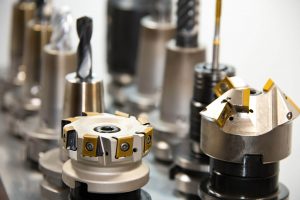
Fabrication and manufacturing are industrial terms linked to the process of production or construction. Often, the two processes are confused, yet they are very different from each other. This article explores the meaning of both fabrication and manufacturing in industrial processes.
Fabrication is the process of constructing products by combining typically standardised parts using one or more individual processes. For example, steel fabrication is the production of metal structures using a range of processes such as cutting, bending and assembling. Metal fabrication will often form a complete assembly made from smaller sub assemblies for use with readily available standard sections. This is achieved with computer-aided designs (CAD) that are often programmed using computer numerical control (CNC) technology which communicates directly with machinery on the factory floor. By using these technologies, the quality standards of production are increased and higher quality assemblies are produced. This ensures a more accurate and quicker steel erection time on site, which is vital in high volume production, reducing cost for the customer through better material utilisation and faster assembly times.
Alpha Manufacturing has a team of design experts, experienced in creating fully assembled prototypes for prior sign off. This, alongside access to the best in machine and tooling technology, gives our customers peace of mind and expertly crafted end products. Some areas of expertise include:
You can read more about sheet metal fabrication here.
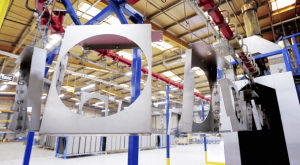
Manufacturing is the process of converting raw material into a finished product. Essentially, it is producing something from start to finish. The manufacturing sector involves large scale production with the use of machines, tools and chemical/biological processing. It is the course that raw materials have to undergo before being considered a final product. There are many different sectors that fall into this category, including:
Alpha Manufacturing is able to offer a start to finish process to suit virtually any sheet metal requirement. From design to CNC machining, assembly to delivery, a full service is available.
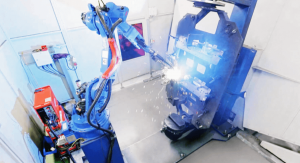
The key difference between manufacturing and fabrication is how much of the process a job involves. Fabrication involves the assembly of standard or specialised parts to form parts of a product to be used in the manufacture of the finished piece. Manufacturing, however, is a start to finish movement, from the creation of parts through to the final assembly to produce a finished product, often using areas of fabrication within the manufacturing process.
At Alpha Manufacturing, we manufacture a range of steps of tread plates for commercial vehicles and agricultural machinery. This step is variation of a product that we manufacture for one of our commercial vehicle customers.
Our design team begin by creating firstly a 2D drawing of the step, then a 3D CAD model. These will be signed off by our customer, usually along with a prototype sample. The models are then converted into programs (CAM) which tells the processing machine how to handle the part.

The first process in the manufacturing of this step is CNC Punching. A sheet of 2.5mm CR4 (Cold Rolled Steel) material is loaded by the automated sheet-master tool.
A purpose made 934 step forming tool is selected by the tool changer and the machine begins to punch. The tread pattern is formed using a single hit from the tool as the punch bed moves the metal sheet along.
Tread plate forming using a Trumpf TruPunch 5000 machine:

One the tread pattern has been punched the metal sheets are loaded into the laser cutting machine by an automated bed. The laser then cuts the step profile form the sheet along with custom lettering which is programmed to suit the customer.
Lines are etched onto the step to mark fold lines and slots are also cut to aid the welding process at a later stage. Once the Laser cutting is complete, a machine operator removes any waste material, leaving just a flat step profile.
Laser cut profiles, slots and etching using a Trump TruLaser 3030:

Next, the flat profiles are folded into shape using a press brake. An operator manually sets up the tools and programs the machine according to the instructions on the part drawing. He uses the etched fold lines as guidance before applying the bend.
After applying the fold, the operator measures to ensure the angle is correct and within tolerance.
Folding using an Amada Press Brake:

Once folded into shape, the seams are joined by welding. For this particular part, a MIG weld is used whereby a wire electrode is fed through a welding gun and an electric arc is formed between the wire and the metal workpiece. Resultant heat causes fusion of the metal.
The welder also attaches small inserts to the underside of the step using the slots previously cut on the laser machine (Slot and tab). These inserts are used to attach the step to the vehicle later. Once the welding is complete the welder linishes the part, removing any excess with a grinder to leave a smooth finish.
MIG (Metal Inert Gas) welding, slot and tab and linishing:

The final production stage is to powder coat the product. Firstly, it is pre-treated with an alkaline solution, which is then rinsed off before another a specialised pre-treatment solution – Oxsilan 9810 is applied and once again rinsed off before the part is dried in an oven.
Now ready for coating, the part passes through an automated electrostatic spraying booth where the particular coloured powder is applied. The powder clings to the metal thanks to an electrostatic charge. Any areas missed by the spray booth are then touched up by a manual sprayer who also checks quality and coat thickness.
The part is then passed through another oven at up to 200oc at which stage the powder cures and bonds under the intense heat to create a smooth, glossy finish.
Automated powder coating line:
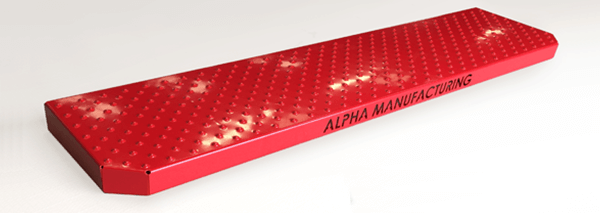

The annual trip to Elan Valley has become an integral part of Alpha’s Apprenticeship programme with all 1st year Apprentices attending ahead of their workplace training.
The three day course began with basics of team work and communication and gradually allowed the Apprentices to develop in their teams , solving increasingly challenging tasks.

An early start saw the team leave the Bri-Stor Head Offices at around 6.00am, arriving in Wales just before 10.00am where they were welcomed by course leaders and given their brief for the day.
The day consisted of a series of communication focussed tasks designed to focus the group on the strengths of individual members and importance to the team as a whole.
The first challenge of the day was a test of team communication where a ball needed to be passed between members in the quickest possible time. From a slow initial attempt, the team were asked to focus on every individual’s role within the team and how better communication could improve performance.
A range of team challenges followed, from building the tallest tower out of bamboo poles, to creating a perfect square and various orienteering tasks, all carefully constructed to test the communication and team working of the teams. After each challenge the Apprentices where given time to reflect on how better communication and joined up thinking allowed them to progressively improve their performance.
The day concluded with an in-depth review of the days activities and course leaders delivered some classroom theory to back up the practical work that the teams had throughout the day.

The second day tested the teams further, building on the previous day’s progress and pushing them to achieve much more difficult goals by working together in an organised and thoughtful way.
A high rope challenge required individual team members to navigate a tree top course while receiving instruction from others on the ground. Communication was vital in passing on collective team knowledge on the best way to tackle tricky obstacles.
The challenge finished with a leap of faith where team members on the ground provided advice and encouragement to their partners for them to leap from a high platform.
Next up was a raft race across the Elan Valley Damn on rafts built by the teams. Using collective thinking and solid communication, the teams worked out a sound raft design and method of travelling in the water. A short de brief followed where the teams reflected on their successes and areas of improvement.
Again, the day concluded with an evening of theory delivered by course leaders where the Apprentices learned the importance of individual team roles, delegation and responsibility. They were asked to apply this to the days activities and reflect on how they might have streamlined processes.

The third and final day focused on planning and executing a solution to a specific problem. Teams were given a set of instruction on how to complete a task before being allowed time to discuss and agree an approach to best solve the problem. After the first challenge of the day the teams reviewed their individual strategies and discussed where they could have made improvements.
Course leaders then gave the teams 9 individual challenges to complete by the end of the day and allowed them 3 hours to put together an effective plan to complete each. The teams then set about completing the hill walk, a nail puzzle, flag/logo quiz, tower build, forest orienteering, team juggle, maze ball, mountain bike trail and archery challenges, following their agreed plans.
One final evening session saw the Apprentices review the entire course and the skills they had learned throughout, specifically communication, planning and leadership, efficiency and effective planning. The course concluded with the Apprentices being asked to consider how all of these elements contribute to their success in the working environment.
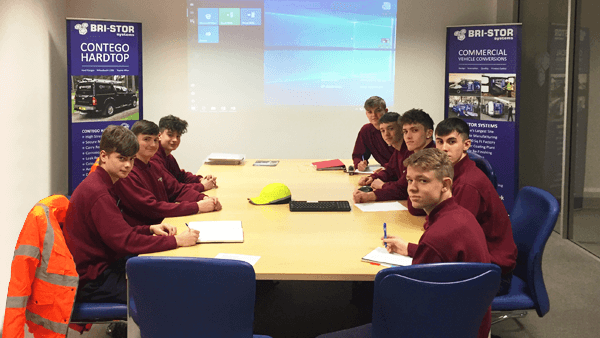
For the third consecutive year, first year Apprentices from across the Bri-Stor Group will compete in the local Stone Festival Soapbox Derby during June in support of our charity partner Help for Heroes. Two teams from the Group will enter the race with Alpha Manufacturing Apprentices competing against their Bri-Stor Systems counterparts.
The project has proved to be a great way of integrating our first-year apprentices as they work together to design, prototype, manufacture and test their racer. Our entrants have traditionally fared well in the event with the “Alpha Males” team finishing second overall in 2016 and the “Bri-Stor Bullets” taking bragging rights during last year’s event.
Bri-Stor Group have been involved in the Stone Festival event since it’s conception in 2016 and last year sponsored the event. Apprentices also take the opportunity to support Help for Heroes during the event, raising awareness and taking donations on the day.
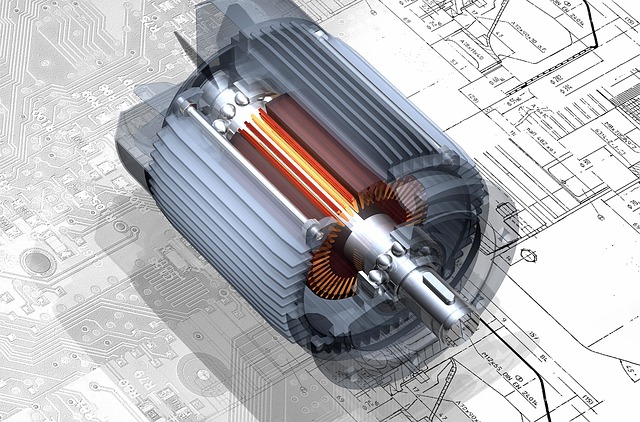
Computer numerically controlled metal turning is an automated manufacturing process where a lathe turns around on various axis at high speed. Cutting tools, controlled by an intelligent computer software, are moved to cut away excess material. The lathe is versatile and must be able to manoeuvre the complexities of the product design to find the most appropriate solution. Here is the process that takes place:
Similar to CNC turning, CNC milling is also an automated manufacturing process. Completed by a computer numerically controlled device, milling is accomplished using a rotating tool that moves in a variety of directions which ultimately brings the initial design to life. The process that takes places is as follows:
The industry relies heavily on CNC machining as opposed to more conventional methods of sheet metal manufacturing. Industries such as aerospace, automotive and more all produce products at a high rate and modern manufacturing processes must be able to keep up. The two most notable advantages of CNC turning and milling are:
Want to find out more about CNC milling and turning? Take a look at our resources section for more information.
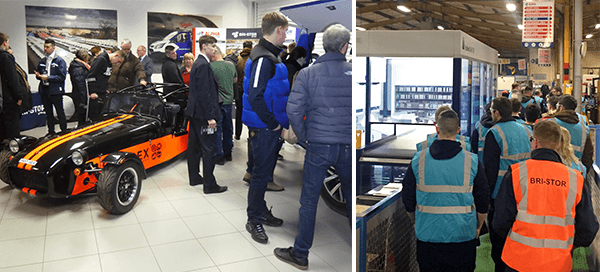
Prospective Apprenticeship candidates of both Alpha Manufacturing and Bri-Stor Systems were welcomed, along with their parents to come and discover what the apprenticeship programme has to offer.
Around 100 students and parents gathered at Bri-Stor Systems where they were welcomed by current and former apprentices alongside Bri-Stor Group directors. Split into small groups, they were then given a guided tour of the entire site including Bri-Stor Systems assembly area, Atlas Coating powder coating plant and Alpha’s Manufacturing facilities.
The success of the open evening, which was the busiest since the Group began holding the event, reflects the significant growth of the Apprenticeship programme in recent years.
Alpha’s Apprenticeship manager Stephen Bowen said of the evening:
“It’s great to see so many young people now seriously considering an engineering apprenticeship over other options such as A-Levels. The turnout this evening and the amount of applications that we’re now receiving shows how perceptions are changing as young people see the benefits of joining a programme that offers hands on experience and a real chance of progression.”
Applications for the 2018 programme will now be open until mid-February when all applications will be assessed and interviews arranged. If you’re interested in an Engineering apprenticeship and would like to apply, contact apprenticeships@bri-stor.co.uk for further information.
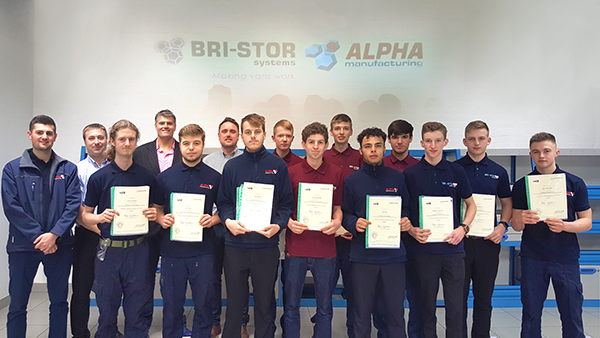
The young group gathered at Bri-Stor Group offices to be handed their certificates by Group Director Martin Smith, proudly watched by apprentice managers Stephen Bowen and Will Davies Hill who have mentored the group since they first arrived.
Martin commented afterwards:
“They have all worked really hard so far, taking on everything we’ve asked of them and should be extremely proud of themselves today. For me it’s also a proud day as I know that the future of our business depends on young engineers like these and it makes me certain that we’re heading in the right direction”
Both Alpha Manufacturing and Bri-Stor Systems apprentices were all awarded the same NVQ Level 2 in Performing Engineering Operations award. Alpha’s second year apprentices: Josh Boothroyd, Owen Jones, Faisil Khan, Alex Lewis, Ashley Roadley, Sam Weaver and Ryan Yates. Bri-Stor System’s group consisted of: Christopher Golding, Adam Goodey, Joshua Lammond, Reuben Murcott, Alex Orme, Lewis Parker, Tayler Renshaw, Sam Thompson and Harry Wright.

Having spent the last 10 weeks building the track day car from scratch as part of an apprentice team project, the young engineers were delighted to be able to experience it in action. The team, consisting of a mix of Alpha and Bri-Stor apprentices are the second team to complete a Caterham build following the success of the first project earlier this year.
Alongside the newly completed Caterham was a selection of other track day vehicles including the Bri-Stor Group Clio Cup cars and Audi R8 LMS race car in which the apprentices were treated to a few fast laps around Oulton Park.
A great day out for both Alpha and Bri-Stor apprentices and a suiting reward for the hard work and enthusiasm they have shown throughout the course of this project.
Alpha Higher apprentice Gemma Smith is taken for a fast lap of Oulton Park in an Audi R8 LMS Race Car…
Are you interested in an Engineering Apprenticeship? Apply today or contact apprenticeships@bri-stor.co.uk for more information on our apprenticeship programme.